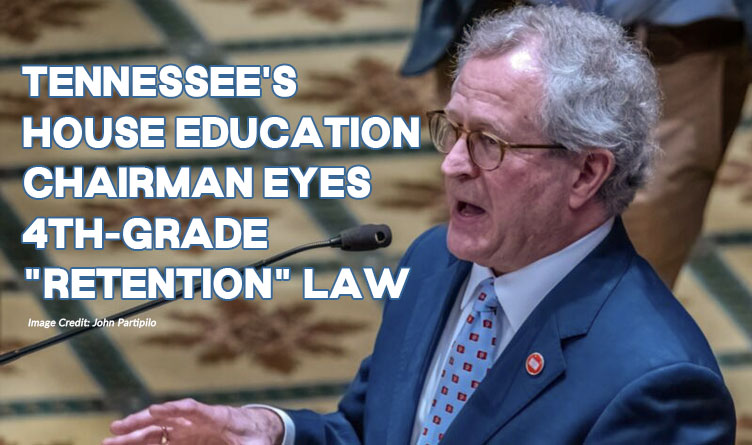White would seek opportunities for tutoring, summer camps.
Image: Rep. Mark White, R-Memphis, is considering expanding a plan that would retain fourth graders from advancing based on reading test scores. Image Credit: John Partipilo
By Sam Stockard [Tennessee Lookout -CC BY-NC-ND 4.0] –
The ink is barely dry on revisions to the state’s third-grade reading and “retention” law, and a House education chairman is considering a similar strategy for fourth-graders, including a plan to advance if they continue to test poorly.
Otherwise, some 6,000 to 12,000 students could be held back, educators say.
Parents and lawmakers statewide raised a ruckus over a 2021 state law that forced third-graders to repeat the grade if they failed to score high enough on the reading portion of the state’s end-of-year test. The Legislature responded by tweaking the law early this year to provide more opportunities for summer school and tutoring, including online learning help, to allow students to advance to the fourth grade.

Amid the uproar over third-grade advancement, Rep. Mark White, chairman of the House Education Administration Committee, wants to take the same approach to fourth-graders, requiring them to score proficiently on the state’s reading test and giving those who remain in danger of failing to advance to the fifth grade another path if they don’t do well. White and Sen. Jon Lundberg, R-Bristol, sponsored the bill that led to this year’s changes to the law.
“Now that we’ve done third-grade retention, what does the fourth grade look like?” White said to the Tennessee Lookout. “We’re going to have to address that because a lot of students, if they’ve been doing tutoring and things in fourth grade, make sure there’s an avenue for them to move on to fifth grade.”
In fact, under a little-known provision in the original law, students who perform poorly on the main achievement test and seek promotion to the fourth grade by taking tutoring are required to show “adequate growth” on the state reading test in order to move to the fifth grade. The State Board of Education recently tweaked its rules to specify how student test scores will be calculated to determine whether they advance.
The reading portion of the fourth-grade test, though, is said to be quite a bit different from the third-grade test, raising questions about how appropriate it is to use that test to judge students’ reading ability from one grade to the next.
The state should consider multiple measures besides the state test, including yearly benchmark tests, to determine whether students’ reading skills are improving in fourth grade, Bradley County Schools Director Linda Cash said.
Multiple assessments are used to decide whether third-graders should move on, including exemptions for special education students or children who speak English as a second language.
“I think you need to look at all aspects of the child, including the teacher’s recommendations as well,” Cash said.
White and other proponents of the third-grade law argued during its passage that new requirements should be enacted because only 66% of third-graders were reading at grade level, according to the state test.
The East Memphis Republican said a measure similar to the third-grade “retention” law needs to be enacted to make sure fourth-graders have an “avenue” to move on to the fifth grade.
“If not, we’re going to have the same issue in fourth grade that everybody’s fearful of in the third grade,” White said.
Thousands of students wound up failing to score high enough on the test this year, leading to protests from parents statewide. But White contends the state offered parents and educators a set of appeals and other student opportunities to be promoted to fourth grade. Many were allowed to retake the test.
Out of 74,742 third-graders, 40% scored proficient in reading this spring, and 3,344 did so after taking the test again, according to the Department of Education. After all exemptions were considered, including those by local districts and fourth-grade retakes, only 898 students were held back.

Critics of the law say students shouldn’t be measured by the results of one reading test and then forced to repeat third grade or attend a summer reading camp.
State Sen. Jeff Yarbro, D-Nashville, complained during Senate floor debate this year that the law would force parents to change summer vacation plans, leading to a rebuke of sorts from Republican Sen. Todd Gardenhire, R-Chattanooga, who said he needed to “shed a tear” for them. Instead of worrying about vacation, he said parents should read to their children.
Other opponents of the law said students who are held back because they barely miss scoring proficient on the reading test will develop low self-esteem.
Over the last 14 years, students fared the poorest in 2021 when only 68% were proficient in reading compared to 50% in 2013. Test scores weren’t recorded in 2020 at the height of the COVID-19 pandemic or in 2016 because of a testing problem.
State Rep. John Ray Clemmons, chairman of the House Democratic Caucus, pointed out that people across the state felt the third grade “retention” law was “poor public policy” when it passed. Clemmons, of Nashville, said he is concerned about how the state decides students show “adequate growth” on fourth-grade tests.
White is undeterred, saying he also wants to take another look at kindergarten, first and second grade to determine whether students should go through summer school or extra tutoring before they’re allowed to advance to the next grade.
“What are we not doing in (kindergarten), 1 and 2 that we would not have an 8-year-old read proficiently?” White said.
The Education Administration chairman also has said he is willing to sponsor a bill by Gov. Bill Lee to dramatically expand the state’s voucher program with funds enabling students to enroll in private schools.
Lee is set to hold a press conference Tuesday to announce his initiative, which would open vouchers to all students statewide.


About the Author: Sam Stockard is a veteran Tennessee reporter and editor, having written for the Daily News Journal in Murfreesboro, where he served as lead editor when the paper won an award for being the state’s best Sunday newspaper two years in a row. He has led the Capitol Hill bureau for The Daily Memphian. His awards include Best Single Editorial from the Tennessee Press Association. Follow Stockard on Twitter @StockardSam




One Response
If they can’t read, they can’t learn the next level.